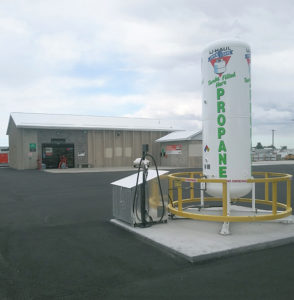U-Haul propane program manager shifts autogas into high gear
Growing up in Southern California, John Barnett liked hot rods and fast cars.

U-Haul is now supplying propane for autogas vehicles and cylinders of all sizes at its store in Casper, Wyoming. Photo courtesy of U-Haul
An introduction to propane came when he sought a method to cool the motor on his 1974 supercharged Chevy Camaro Type LT. Running the car on naturally cold propane, his research told him, would allow him to bring down the engine’s temperature.
“Life happened, and I never got to build the car with a propane system,” Barnett says.
Fast forward to today, and Barnett, 37, finds himself still working in the realm of motor fuels: propane autogas.
“I’m busy with building propane infrastructure; I’m too busy to build a car,” he says, recalling the earlier days again and then adding, “It was a fast car.”
Barnett is the propane program manager at Phoenix-based U-Haul International, where lately he’s been able to fulfill that “personal passion” for engines by promoting the benefits of propane autogas across the country. He’s also seeing the results.
The propane infrastructure Barnett references can be found among the nearly 1,200 U-Haul facilities where propane is sold across the United States and Canada. Propane autogas customers can fill up at any one of these locations, but Barnett is giving some of these locations extra attention by upgrading the refill stations with pumps designed by Blackmer and Corken for autogas applications.
“Historically the marketer owned the equipment and made the investments on the upgrades, but we’ve taken that upon ourselves,” Barnett says. “U-Haul is investing in upgrading that pump. … We own the pump and motor, and the cabinet that houses everything, and the marketer owns the tank.”
Autogas isn’t new for U-Haul, which entered the propane industry in 1984. It just makes sense for a company that values sustainability. It’s running about 300 of its own service vehicles, as well as several rental trucks in Texas, on propane autogas and is considering alternative fuels for the future, Barnett says.
What is different at U-Haul in recent years, though, is its marketing strategy. The company is securing autogas fleet accounts through fueling partnerships with third-party OEM autogas system installers – companies such as Agility Fuel Solutions, Alliance AutoGas, Icom North America and Roush CleanTech.
“We’re providing solutions for them to sell to their customers. The third-party OEM installer will pitch us to test the product,” Barnett says. “For example, we’ve got a transportation company filling up exclusively at one of our sites that Alliance AutoGas pitched to us. They did the conversions.”
U-Haul is also working with propane marketers who are running their own fleets on autogas or are selling the benefits of autogas to fleet customers. Barnett notes how Suburban Propane has worked with Pepsi to test a couple of propane-powered Ford F-750s, which fill up at U-Haul locations. Neither Suburban nor Pepsi have to invest in the refueling infrastructure because U-Haul has it covered.
“More people are realizing we’re there and we’re available,” says Barnett, noting the variety of fleet vehicles that can benefit from propane autogas, including mass transit buses, tow trucks, limousines, taxis, delivery companies, people movers and those in use by school bus transportation companies and high schools.
Barnett envisions a propane industry future of growth with autogas. He’d like to see more propane marketers adopting propane in their own fleets; more school districts ditching diesel for propane-fueled buses; more towing companies realizing that propane is a cleaner solution for their processes; and ultimately seeing the day when consumer vehicles in the United States are running on propane autogas.
“I’d like to help the propane industry get propane as a mainstream fuel and not just call it an alternative fuel,” Barnett says. “We have a lot of work to do.”

















John Barnett was just our keynote speaker at Alabama’s Autogas Answers workshop in Montgomery. He outlined the U-Haul program and his talk was both educational and inspiring to the 50+ attendees.
At the Alabama Clean Fuels Coalition we are working with John and our Department of Transportation to make right-of-way signage available, in keeping with the MUTCD manual, for qualifying Autogas stations on the FHWA propane corridors in Alabama.